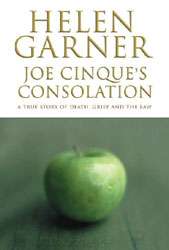Joe Cinque's Consolation
 First edition cover | |
| Author | Helen Garner |
|---|---|
| Country | Australia |
| Language | English |
| Genre | True crime |
| Publisher | Picador |
Publication date | 2004-08-01[1] |
| Pages | 336 |
| ISBN | 978-0-330-36497-3 [1] |
Joe Cinque’s Consolation: A True Story of Death, Grief and the Law is a non-fiction book written by Australian author Helen Garner, and published in 2004. It is an account of Garner's presence at the separate trials of Anu Singh and her friend Madhavi Rao related to the death of Singh's boyfriend Joe Cinque and Garner's attempts to understand the responses to the crime. The book was adapted into a 2016 film of the same name.
Joe Cinque's death
Anu Singh killed Joe Cinque on 26 October 1997 with a lethal dose of heroin after she laced his coffee with Rohypnol. A number of her friends and acquaintances had been informed of her intent to kill him and some were present at parties she held in which he was drugged. She was subsequently found guilty of his manslaughter. The most involved of the friends, Madhavi Rao, was acquitted of all charges.
Summary
Joe Cinque's Consolation begins with Garner being informed of Singh's second 1999 trial and its circumstances, when it was already in progress. She becomes interested and begins attending hearings in Canberra. She relates her impressions of the trial, including her negative reactions to Singh and her mystification at Rao's and others' lack of shock at and complicity in Singh's plans. As the trial progresses she becomes acquainted with Cinque's mother Maria and feels that the court system is not doing sufficient justice to the victim or his family. After the trial Garner interviews Singh's family and attempts to interview Singh and Rao, but both refuse or are uncontactable. She becomes interested in victim's rights, interviews the presiding judge and repeatedly visits and becomes a friend of Cinque's family, and eventually concludes that the purpose of the book is to be Joe Cinque's consolation, as the trial proceedings could not be.
Critical response
Joe Cinque's Consolation was reviewed in a number of major newspapers and magazines. It was praised for its writing[2] and its positioning as Joe Cinque's story.[3] Criticisms of the book centered on it failing to tell the story it set out to tell, particularly its inability to explain Singh or her actions[4][5] and her failure to engage with the purpose of the adversarial justice system.[2]
One reviewer compared it with The First Stone, noting that it was less about the underlying debates and more about the story.[3] Another criticised similarities in their themes, particularly Garner's hostility to the women subjects and their beauty.[2]
Media response
Both Singh herself and Cinque's parents gave interviews shortly after the book's release. Singh recounted her own memories of the killing and her feelings about it after her release and expressed regret at not agreeing to an interview by Garner.[6] She told interviewers that she wished to redress some of the book's imbalance towards her.[7] Maria Cinque said that she would never forgive Singh for killing her son and did not believe her defence against the murder charge.[7] Garner also stated that she still did not understand or empathise with Singh, although some aspects of her behaviour resonated.[8]
Awards and nominations
- Winner (tie), 2005 Ned Kelly Awards (The Crime Writers Association of Australia), Best True Crime[9]
- Finalist and highly commended, 2005 Walkley Awards, Non-fiction book[10]
- Shortlisted, 2005 NSW Premier's Literary Awards, Douglas Stewart Prize for non-fiction[11]
- Shortlisted, 2005 Victorian Premier's Literary Award, The Nettie Palmer Prize for Non-fiction[12]
- Shortlisted, 2006 Adelaide Festival Awards for Literature, non-fiction[13]
Film adaptations
Twelve years after publication, the book was adapted into a 2016 film by writer/director Sotiris Dounoukos and Matt Rubinstein, and produced by Matt Reeder of Night Kitchen Productions. Principal photography ran for seven weeks in Canberra during April to June 2015.[14] There was a principal cast of around 40 main and supporting characters,[15] plus around 300 extras.[16]
References
- 1 2 "Joe Cinque's Consolation". Pan Macmillan Australia. Retrieved 2008-05-24.
- 1 2 3 Dever, Maryanne (February 2004). "Hanging Out for Judgement?". Hecate's Australian Women's Book Review. Archived from the original on 2008-07-23. Retrieved 2008-05-24.
- 1 2 Fraser, Morgan (14 August 2004). "Joe Cinque's Consolation". The Age. Fairfax Media. Retrieved 2008-05-24.
- ↑ Hewitson, Michelle (30 January 2006). "Helen Garner: Joe Cinque's Consolation". The New Zealand Herald. APN News & Media. Retrieved 2008-05-24.
- ↑ Fitzgerald, Michael (11 August 2004). "Everything But the Truth". TIME. Time Inc. Retrieved 2008-05-24.
- ↑ Wyndham, Susan (9 August 2004). "On death and madness". The Sydney Morning Herald. Fairfax Media. Retrieved 2008-05-24.
- 1 2 Anne Delaney (producer) and Phillip Adams (interviewer) (2004-09-23). "Joe Cinque is Dead". Late Night Live. ABC. Radio National.
- ↑ Kerry O'Brien (interviewer) (2004-07-29). "Garner on murder and the justice system". The 7:30 Report. ABC. ABC.
- ↑ "Ned Kelly Award Winners". The Crime Writers Association of Australia. Archived from the original on 2008-04-17. Retrieved 2008-05-24.
- ↑ "The Walkley Awards: 2005 winners". Archived from the original on 19 August 2008. Retrieved 2008-05-24.
- ↑ "NSW Premier's Literary Awards 2005 shortlist". The Sydney Morning Herald. Fairfax Media. 15 April 2005. Retrieved 2008-05-24.
- ↑ "The Nettie Palmer Prize for Non-fiction: Shortlist 2005". State Library of Victoria. 28 September 2005. Archived from the original on 9 September 2007. Retrieved 2008-05-24.
- ↑ "2006 Adelaide Festival Awards for Literature". 21 February 2006. Archived from the original on 9 September 2007. Retrieved 2008-05-24.
- ↑ It's a wrap for Joe Cinque's Consolation, if.com.au, 15 June 2015, accessed 20 January 2016
- ↑ Joe Cinque's Consolation, IMDB, accessed 20 January 2016
- ↑ Casting for 300 extras as Joe Cinque's Consolation starts filming in Canberra, Natasha Rudra, Canberra Times, 24 April 2015, accessed 20 January 2016